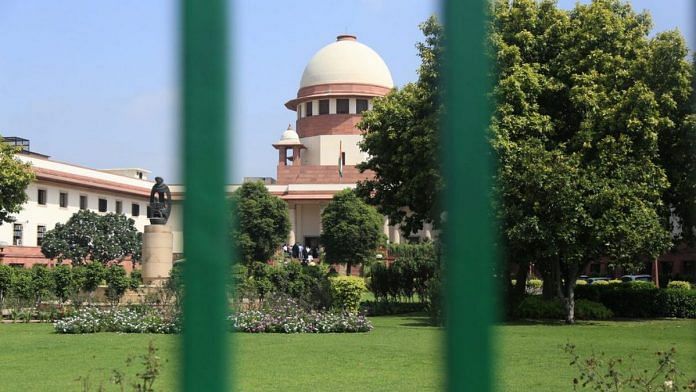New Delhi: The Supreme Court last month lifted a 13-year-old stay imposed by the Allahabad High Court in a case of alleged custodial death dating back to 1997, paving the way for a murder trial against six police personnel from Madhya Pradesh Police.
In its 23 September order, a Supreme Court bench led by Justice Sanjay Kishan Kaul also sought a report on the delay in the case from Allahabad High Court Chief Justice Govind Mathur.
The bench told the Chief Justice to seek an explanation from the high court administration “as to why such a situation came to pass and why the trial court order remained stayed for 13 years by an ad interim (temporary) order in case of a custodial death”.
“The Chief Justice may call upon the Registrar of the High Court to look into the matter and thereafter a report be submitted on the administrative side before this court,” it ordered.
The six accused, then posted at the Kotwali Sandoh police station in Madhya Pradesh, are alleged to have illegally picked up a man from Varanasi on 28 February 1997 at the behest of a local businessman and beaten him to death in custody.
The case reached the Supreme Court after the man’s son, Sanjay Gupta, who was 23 when the crime occurred, approached it in 2018 against the delayed proceedings in the case.
“Thirteen years is a long time for a matter to remain undecided in a high court. It was not even an appeal against a final verdict in the case. The order that was challenged was an innocuous summoning order. The prime accused in the case has retired from the job, while two have died,” he told ThePrint.
According to Gupta, the high court had put the trial on hold in January 2008 after the officers challenged an order issued by a chief judicial magistrate meant to summon them as accused in May 2007.
The chief judicial magistrate’s order came on a protest petition filed by Gupta to oppose police’s closure report in the matter. “I struggled from day one to get justice for my father’s death,” he told ThePrint.
He said, at the time, requests to lodge a case against the policemen were turned down by Varanasi police, after which he filed a petition under Section 156 (3) of the Criminal Procedure Code (CrPc) to direct police to take the case for investigation. According to the section, a magistrate has the power to order a police investigation.
However, while police did start an investigation into the matter on the direction of the court, they filed a closure report in October 1998. This prompted Gupta to file a protest petition and he succeeded when the chief judicial magistrate issued the summoning order, nine years later.
Also read: There were 300 custodial deaths from 2008 to 2016, but zero convictions
Delays aplenty
Gupta said he was surprised at the high court’s “laxity” in the case.
“Since the stay of the trial favoured the accused, they were in no hurry to have a hearing. Therefore, their lawyers used to move an illness slip, akin to an adjournment slip, before every hearing, resulting in the case getting adjourned,” he told ThePrint.
According to him, the case remained unheard till 2013. It was then listed, heard and reserved for order.
However, six months later, the judge recused himself from the matter without giving any reasons and ordered it to be listed before a new bench. This meant the case had to be argued all over again.
The matter was heard once in 2017 but never got listed after that. “I was finally told by my lawyer in Allahabad to knock the doors of the Supreme Court, which I did in 2018,” said Gupta.
His lawyer, Divyesh Pratap Singh, said the accused attempted to delay the proceedings in the apex court as well by refusing to accept the court notice.
Also read: Don’t just question police for custodial killings of Jayaraj-Bennix. Courts also responsible
Ante-mortem injuries point to murder, Gupta says
Gupta said he was informed of his father’s death on 1 March 1997, a day after the latter was allegedly forcibly taken by the accused.
When he reached Kotwali Sandoh, he was told that his father had suffered a cardiac arrest. However, according to Gupta, the “ante-mortem injuries on the body revealed that he was beaten to death”. “The body was swollen excessively,” he said.
Police allegedly refused to hand over the body to him for an autopsy or even to perform last rites. “They burnt it on 3 March at 4 pm,” recalled Gupta.
He presented his father’s medical report from 23 February 1997, seven days before his death, to refute police’s claim that he had suffered a heart attack.
Taking cognisance of the long “passage of 13 years”, the top court directed a trial court in Varanasi to complete the case within a year. It even asked the trial judge to hear the case on a daily basis.
“I went to court… and submitted the top court’s order with the chief judicial magistrate’s court. He accepted and admitted the plea for a hearing,” said Gupta, adding that he hoped the judge would make an earnest effort.
Also read: Life of a judge is not a bed of roses, says Supreme Court judge NV Ramana



